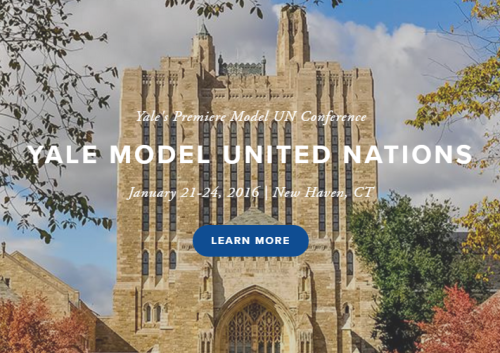This guest post was written by Michael Carden. He is the current Undersecretary-General of General Assembly Committees for Yale Model United Nations.
With the forty-second annual session of Yale Model United Nations just days away, we are excited to soon be welcoming delegates from across the United States and around the globe for a thrilling weekend at Yale’s historic campus in New Haven, Connecticut. In particular, we are proud to announce new features to YMUN XLII: a unique and innovative approach to parliamentary procedure and an interactive, online MUN delegate training platform.
To ensure the best experience for delegates, we are premiering a unique debate style and rules of procedure. “YMUN Procedure” combines the best of UNA-USA style of Model UN, with its emphasis on impromptu and eloquent speaking, and THIMUN rules that allow for high quality content of resolutions and efficient pace of debate.
For those who attended last year’s conference, this will sound familiar, as it was implemented in the Specialized, Regional Bodies, and ECOSOC organs. This year, the procedure is being used across the board and has been revised to ensure the best possible experience for delegates. Using YMUN Procedure, each committee will devote equal time to each topic, with the first half of the conference focusing on topic 1 and the second half on topic 2. Within time on each topic, there will be a moderated caucus to start the debate, an unmoderated caucus for lobbying and clause drafting, and then clause-by-clause debate, with the option of one moderated caucus during debate. This process will then be repeated for topic 2. All parts of this process are facilitated and moderated by the Dais team. Our procedure dictates that only one resolution will be passed per topic, just like it is done at the United Nations. Within each topic, debate time will be split into the moderated caucus, un-moderated caucuses, and clause-by-clause debate. This procedure allows delegates to focus in on specific aspects of each topic and then incorporate all of these concepts into one resolution for the issue. It promotes and reinforces the original spirit of MUN: diplomacy, collaboration, and solving.
YMUN is also proud to announce an online education curriculum, specially designed to help delegates become familiar with YMUN Procedure prior to the conference. The online platform provides tools for delegates to hone their skills in areas such as parliamentary procedure, research & position paper writing, clause writing, and debating. Modeled after the popular “Khan Academy”, we have designed a user-friendly interface for delegates to watch instructional videos, quiz themselves on the presented material, and track their progress along the way.
Finally, in line with our mission to revitalize our commitment to education, we have created a new set of Awards Criteria to make the process as holistic, transparent and fair as possible. YMUN Awards Criteria consists of three components: Impromptu Speaking, Clause Writing and Active Participation. For many delegates, winning a MUN award is considered the peak of MUN success. Whereas delegates should also make sure to thoroughly enjoy their experiences, engage fully in debate, and meet and work with other delegates, awards can still be an important part of a MUN conference. Our goal is to encourage delegates to strive to achieve awards and a successful conference, regardless of awards. In recognition of this inclusive mission, we have decided not to have delegation awards in order to focus attention on individual achievement.



